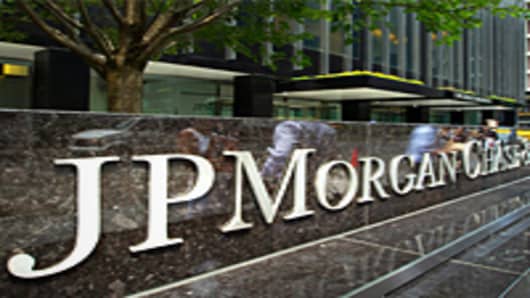Following a 9 percent decline on Friday to $36.96, JPMorgan Chase’s shares traded down again on Monday.
Hagerman said that investors were “stunned by the announcement, particularly considering most investors have some ownership position in [JPMorgan Chase], particularly as a hedge against other potential risks tied to the broker/dealers as a whole,” and that aside from some investors who were “more optimistic on the company, looking for a buying opportunity at or below tangible book value ($34.19),” most investors “were decidingly more negative on not only JPM, but also the broker/dealers as a whole.”
The increased risks for the broker/dealer space, according to Hagerman, include “the likelihood of more severe downgrades by Moody’s next month, ongoing euro zone risks, accelerating rules, and toughened Fed position towards policy surrounding the Volker Rule , as well as likely diminishing revenues and profitability.”
Hagerman added that “the outsized trading loss and break-down in internal controls could potentially place JPM under some form of supervisory action down the road following the completion of various regulatory reviews of the loss and associated enterprise risk [management] processes/controls,” and that “the ongoing review and/or the possibility of supervisory action could possibly curtail, or even cease the company’s capital buyback abilities sooner rather than later.”
In March, following the completion of the Federal Reserve’s annual stress tests, JPMorgan’s board of directors authorized $12 billion in common share repurchases for 2012, with another $3 billion in buybacks authorized for the first quarter of 2013.
Hagerman has a “neutral” rating on JPMorgan Chase, with a $50 price target, estimating the company will earn $4.90 a share this year, followed by 2013 earnings per share of $5.50.
Citigroup analyst Keith Horowitz has a different take on JPMorgan Chase, saying on Friday that the shares offered investors the “best potential absolute returns in the space,” among the largest U.S. bank holding companies, although he also said that he was “assuming lower buyback activity of $5 billion in 2012 to be conservative.”
While Horowitz also said that the timing of JPMorgan’s loss “could not have been worse, and will likely impact all capital market sensitive stocks due to increased concerns of a more restrictive Volker Rule,” he was “not convinced this will necessarily lead to a much stricter rule that will significantly impact” trading returns, “since the other side of the coin is that it would severely impact liquidity in the markets.”
Horowitz rates JPMorgan Chase a “buy,” with a $45 price target, estimating the company will earn $4.35 a share this year, followed by earnings per share of $5.20 during 2013.
JPMorgan Chase’s shares returned 13 percent year-to-date through Friday’s close, pulling back 20 percent from their year-to-date closing high of $46.49 on March 27.
At Friday’s close, JPMorgan’s shares traded for 1.2 times tangible book value, according to Thomson Reuters Bank Insight, and for less than seven times the consensus 2013 earnings estimate of $5.54 a share, among analysts polled by Thomson Reuters. The consensus 2012 earnings per share estimate was $4.68.
Hagerman suggested that investors “stick with quality regionals, particularly as a safety trade for the time being,” with Sterne Agee’s “favorite names” remaining Wells Fargo and PNC Financial Services Group, with “favorite momentum plays” including BB&T and PacWest Bancorp.
Shares of Wells Fargo closed at $33.31 Friday, returning 23 percent year-to-date, following a 10 percent decline during 2011. The shares trade for twice their tangible book value and nine times the consensus 2013 earnings per share estimate of $3.68. The consensus 2012 earnings per share estimate is $3.28. Hagerman rates Wells Fargo a “buy,” with a $38 price target.
Shares of PNC closed at $65.48 Friday, returning 15 percent year-to-date, following a 3 percent decline last year. The shares trade for 1.4 times tangible book value and 9.5 times the consensus 2013 earnings per share estimate of $6.89. The consensus 2012 earnings per share estimate is $6.19. Hagerman rates PNC a “buy,” with a $74 price target.
Shares of BB&T of Winston-Salem, N.C., closed at $31.75 Friday, returning 28 percent year-to-date, following a 2 percent decline during 2011. The shares trade for 2.1 times tangible book value and 10.5 times the consensus 2013 earnings per share estimate of $3.02. The consensus 2012 earnings per share estimate is $2.68. Hagerman rates BB&T a “buy,” with a $35 price target.
Shares of PacWest Bancorp of Los Angeles closed at $24.55 Friday, returning 31 percent year-to-date, following a 10 percent decline last year. The shares trade for 1.9 times tangible book value, according to Worldscope data provided by Thomson Reuters, and 13 times the consensus 2013 earnings per share estimate of 1.89. The consensus 2012 earnings per share estimate is $1.80. Hagerman has a “hold” rating on PacWest, with a $28 price target.
Additional News: Jamie Dimon: Trading Losses Are Not Life-Threatening
Additional Views: Beware ‘Knee-Jerk’ Reaction After JPMorgan Loss: Banker
_____________________________
CNBC Data Pages:
______________________________
Disclosures:
TheStreet’s editorial policy prohibits staff editors, reporters, and analysts from holding positions in any individual stocks.
Disclaimer


